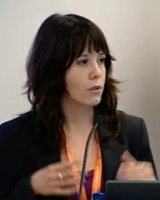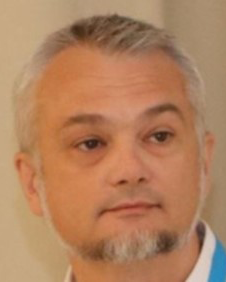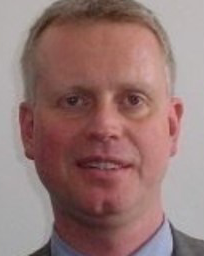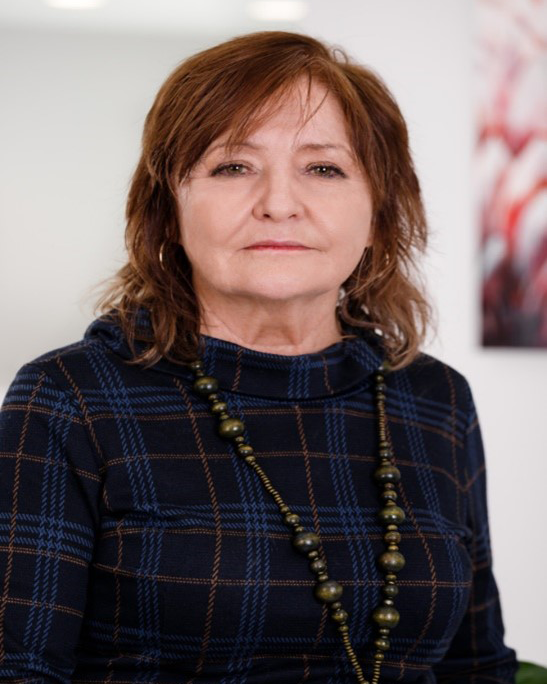
Dr. MICHELLE PERELLO
Founder and Director of Consulta Europa,
Las Palmas, Canarias, Spain
Topic:EU PROJECTS FOR MODERNIZATION AND COMPETITIVENESS OF UNIVERSITIES
Abstract
After 5 years as an independent consultant, in 2009 he founded Consulta Europa Projects and Innovation with the aim of developing innovation and capacity building projects that could support smart, sustainable and inclusive growth. Consulta Europa operates as a 'local development' company, connecting and engaging with academia, industry, policy and civil society organisations. It develops and manages several EU-funded projects, always presenting the special perspective of Europe's peripheral and island regions. Areas of expertise: Process and social innovation; Policies for regional development and innovation capacity. She has been living in Brussels for 6 years as a representative.

ASSOC. PROF. BOGDAN FLEAKA, PhD
Polytechnic University, Bucharest, Romania
Topic:ANALYSIS OF CURRENT TRENDS IN MONITORING SUSTAINABLE DEVELOPMENT
Abstract
Dr. Fleaca's business experience (2006-2009) is related to the L'Oréal company, where he controlled the commercial and marketing activities in the pharmacy of Romania and created a network of distributors for Garnier Division products. In the period 2009-2012, he worked for the company Johnson & Johnson, Romania, where he was the national manager of trade and pharmaceutical marketing (cosmetics). Controls the activity of pharmacy chains. Launches the dermatology cosmetics brand RoC to the mass market and develops the merchandising guidelines for Listerine, Compeed and other medical cosmetics

UWE KOEHLER
General Manager at Husqvarna Construction Tools, Ruse, Bulgaria
Topic:THE TRANSITION TO INDUSTRY 5.0 AND ITS IMPACT ON PEOPLE'S LIVES
Abstract
In 1984, he graduated in political science at the Universität Duisburg-Essen, Standort Duisburg. Later (1994) he became a professional Bachelor of Industry Management (CCI) at the Chamber of Commerce. Subsequently, in London Business School in 2005 he graduated in Finance for Senior Managers, and in Ambai University (2006) he received a Master's in Business Administration. Specialized in two business programs for the development of executive directors at the International Institute for Management Development - IMD (2007-2008).
Has competencies in: Supply chain management; Logistics; Human Resource Management and Business Process Improvement.

PROF. DONKA BAIKOVA, DSc
Nutrition and Dietetics Specialist
Topic:NUTRITION IN THE PREVENTION OF MODERN SOCIALLY SIGNIFICANT CHRONIC NON-INFECTIOUS AND ACUTE VIRAL DISEASES
Abstract
She was the head of the Physiology of Nutrition section at the National Center for Public Health and Analysis, Sofia. She worked as an expert and consultant for the Ministry of Health and was the head of the Department of Preventive Medicine at Medical University, Sofia. At the moment, he is part of the team of specialists of Markovs Sofia FC.
EU PROJECTS FOR MODERNIZATION AND COMPETITIVENESS OF UNIVERSITIES
MICHELLE PERELLO
Abstract:
Future-oriented projects are large-scale activities that aim to identify, develop, test and evaluate innovative approaches (in policy) with the potential for mainstreaming, thereby improving education and training systems. They support development-oriented ideas responding to key European priorities that contribute to the improvement of education and training systems, as well as to generate significant innovative action in terms of methods and practices for all types of learning and the parameters for active participation in European social cohesion.
The presentation supports the thesis of developing transnational cooperation projects that carry out a coherent and comprehensive set of sectoral or cross-sectoral activities that: promote innovation in terms of scope, innovative methods and practices and/or ensure the transfer of innovations (between countries , policy sectors or target groups), thus ensuring at European level the sustainable use of innovative project results and/or their adaptation in different contexts and audiences.
Successful will be those of them that achieve a systemic impact at the European level, by proving the capacity to implement innovative results on a European scale and/or that can transfer them to different thematic or geographical contexts.
ANALYSIS OF CURRENT TRENDS IN MONITORING SUSTAINABLE DEVELOPMENT
BOGDAN FLEAKǍ
Abstract: Romanian government legislation, investor and stakeholder expectations, as well as international voluntary initiatives have contributed to the growing demand for high-quality information on sustainability issues. The scientific community investigating the problem is expanding rapidly and the need for data is growing significantly. This is a rapidly evolving topic with many different monitoring frameworks, with some criteria overlapping, creating problems with consistency globally. This often causes uncertainty about how the data should be used to produce useful results and science-based resources. The presentation shows current monitoring trends related to sustainability, including specific analysis at the state and corporate level. An updated overview of the sources of sustainability reporting is presented, followed by a focus on well-known tools (ie, the SDG Index and the International Distribution Index) used to monitor and report nations' progress toward the SDGs.
THE TRANSITION TO INDUSTRY 5.0 AND ITS IMPACT ON PEOPLE'S LIVES
UWE KOEHLER
Abstract:
5.0 provides a vision for industry that moves beyond efficiency and productivity as the sole goals, and strengthens the role and contribution of industry to society. It puts "...the well-being of human resources at the center of the production process and uses new technologies to ensure prosperity beyond jobs and growth, while respecting the productive capabilities of the Planet," reads the European Commission's (EC) definition of the next industrial revolution According to the EC, it complements the existing "Industry 4.0" approach by specifically placing research and innovation at the service of the transition to a sustainable, human-oriented European industry.
Industry 5.0 is the first concept that is not so much focused on the optimization of production, but on how to make people's lives better - both in the role of employees and consumers.
The foundations of Version 5.0 have already been laid in 4.0. Smart factories use autonomous vehicles to optimize their processes. Many of the big ports are an example of this - when unloading containers, this activity is performed by automated trolleys that follow the exact route, load themselves, etc. Husqvarna's smart factory in Ruse also uses similar technologies. This is part of Industry 5.0, which is already present in the previous concept. The same applies to the joint work of a person with a robot through the so-called collaborative robots.
NUTRITION IN THE PREVENTION OF MODERN SOCIALLY SIGNIFICANT CHRONIC NON-INFECTIOUS AND ACUTE VIRAL DISEASES
DONKA BAIKOVA
Abstract: The present presentation makes an expert review, analysis and discussion of data from scientific studies regarding the place of nutrition in the prevention of modern socially significant non-infectious and infectious diseases. The author analyzes and evaluates scientific information regarding dietary approaches to reduce or eliminate reversible risk factors for the development of obesity, dyslipidemias, hypertension, and low physical activity. Dietary therapeutic principles for minimizing difficult, but still reversible risk factors - insulin resistance, type II diabetes, increased tendency to thrombosis, high levels of homocysteine in the blood - are discussed. A special topic is the author's analysis and discussion of expert opinions regarding the optimization of the nutritional model in the prevention of viral infections, in particular - of COVID-19.
Invited speakers from previous years: 2022 | 2021 | 2020 | 2019 | 2018 | 2017 | 2016 | 2015